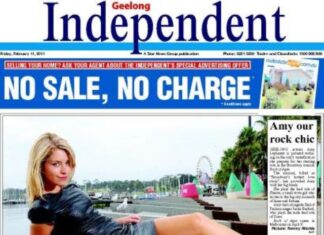Peter Farago
A SORRY is in order about Jo Whiteside’s letter to the editor on compensation to the Aboriginal stolen generations last week.
Ms Whiteside accused me of a “knee-jerk” reaction for defending the Independent against criticism for revealing that 35 Aborigines were considering launching court action for compensation after the apology to the stolen generations.
She reasoned it was a knee-jerk reaction because if my mother, father or other close relative had suffered in the way of the stolen generations then an official apology would be the first remedy I would seek.
Well, sorry Jo, I didn’t specifically address my opinion of the apology on February 22.
I never said an apology wasn’t due.
In fact, I support it, not that my opinion is important to this debate.
What I don’t support is hiding from the public that, to many people, the apology was not simply an admission of sorrow or empty rhetoric – it was an admission of responsibility that required reparation.
Failing to report these views would be bowing to political correctness and wrong.
Readers deserve to know the facts, no matter how disturbing or personally distasteful.
In a democracy voters should be able to participate in an informed debate, not simply decide their future by listening to party doctrine or a popular opinion.
At the time there was plenty of copy in publications across the country describing the apology as a watershed moment in the nation’s history and the chance to turn to a new page.
And it was.
But should readers be kept in the dark about the many people who took that new page to also include compensation to the stolen generations for past misdeeds.
People should be armed with knowledge of all sides of a story.
In the case of a national apology to the stolen generations, that also meant local Aborigines believed financial compensation was due despite the Federal Government ruling out creation of compensation fund.
That’s not a knee-jerk reaction, that’s not a conservative or right-wing view, that’s reporting all views because there are plenty of people who want to see compensation paid and others who think the nation should simply get on with improving living conditions for many Aboriginal communities.
If presenting both sides of a story produces a knee-jerk reaction in the community, it’s not the paper’s fault.
It’s that these readers have closed their minds to the other side of the story, the side that Jo Whiteside presented in her letter?
Yes, Aboriginal cultures do bring revenue from tourists and art buyers into Australia – including taxes.
And, yes, Australia does benefit from the mineral resources excavated from land of which Aboriginal people were, or in some case still are, custodians.
A debate should be honest, fair and informed.
But “educated journalism” shouldn’t mean hiding from controversial stories because readers might react the “wrong” way.
I’m sorry, it’s a fact
Digital Edition
Subscribe
Get an all ACCESS PASS to the News and your Digital Edition with an online subscription
From the archives
15 years ago
11 February, 2011
Tourism lobbyists are seeking $30 million from State Government to build a Geelong Convention Centre within the next four years.
Victorian...








